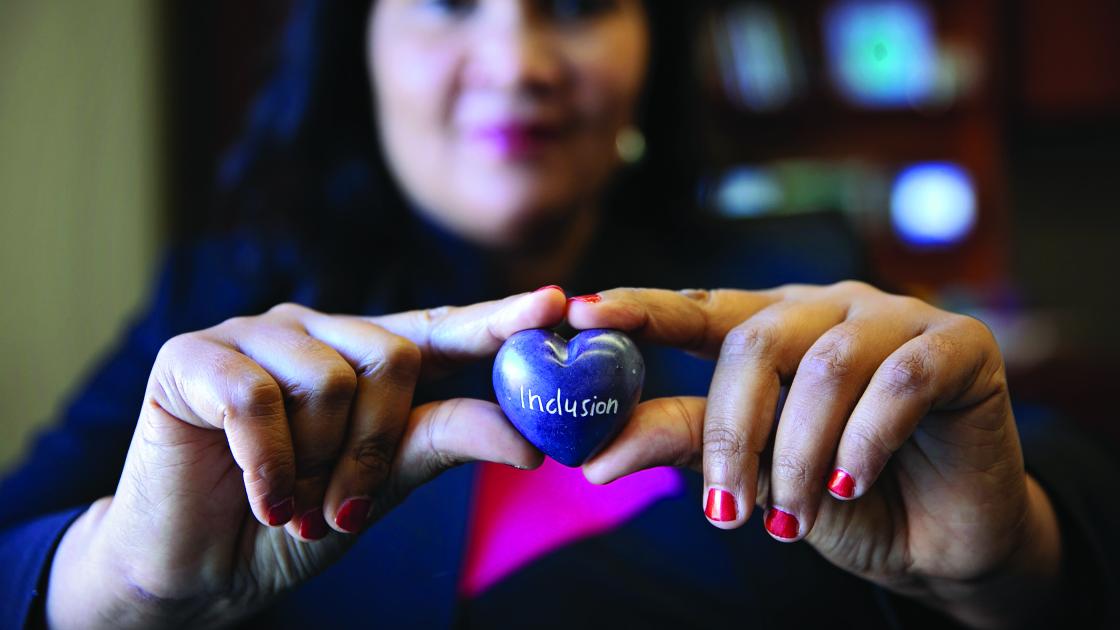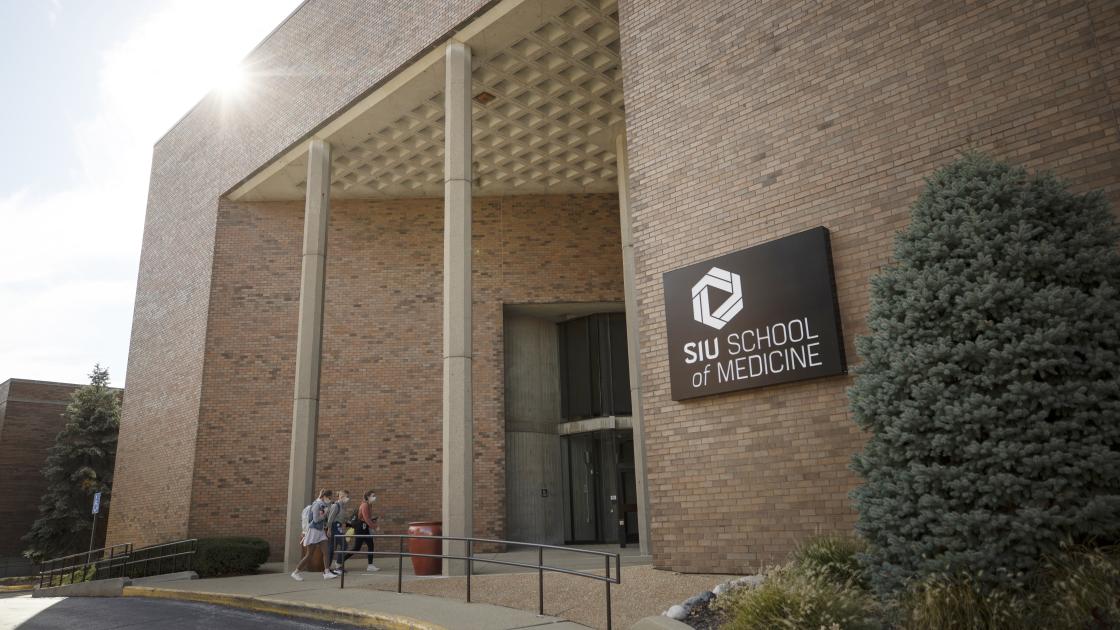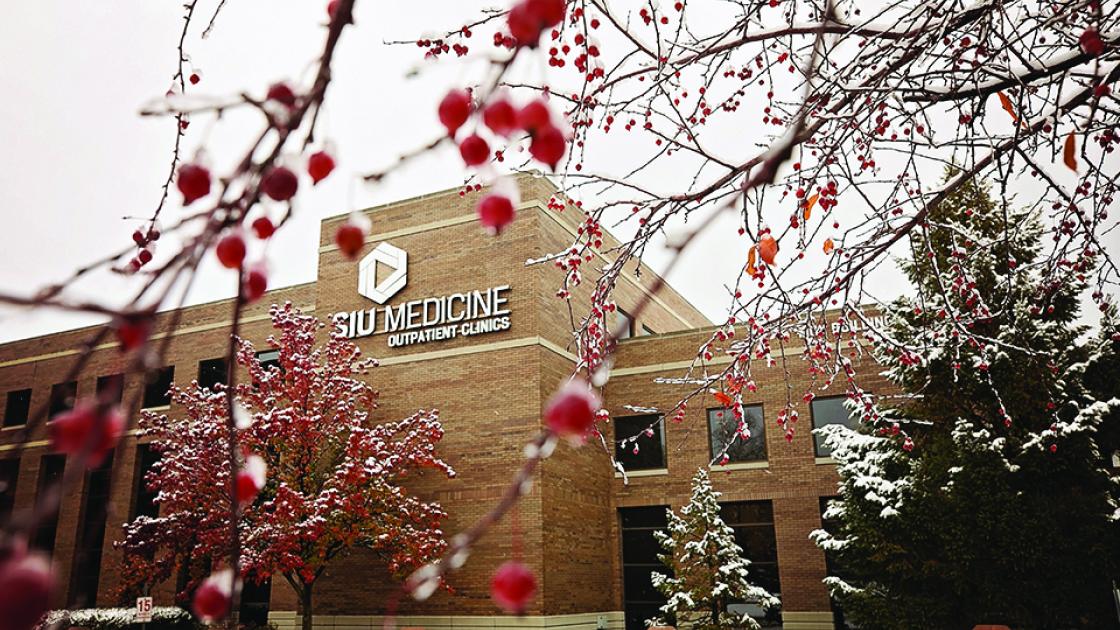
Wendi Wills El-Amin’s journey to the Office of Equity, Diversity and Inclusion
“I'm a third-generation healer. My father is a physician; my grandmother delivered babies. It's part of my path and I want to honor this legacy.”
Wendi Wills El-Amin, MD, is also a third-generation educator. Both her grandfather and mother were science teachers. Her work in academia is not only an extension of her father's work, but it also mirrors her mother's magnetic way of teaching neighborhood kids about the sciences.
She can remember asking many questions while she sat on her skateboard, surrounded by neighborhood boys who gathered for “science Saturdays.” Before STEM was in style, many Saturdays started with her mother going to a Houston fish market to buy fish for her and all the neighborhood kids to learn to dissect.
To a young Wendi, there was nothing exceptional about her mother's leadership in science or her father's leadership in medicine. “It was just my world, and that was my street, and that was my block,” she says.
When Wills El-Amin was nine, her father completed his internal medicine residency and the family moved to a new neighborhood with a predominantly white school. In the new environment, she remembers the first time she was called the n-word.
“At the time, I didn't even fully know what it meant,” she recalls. “But everything shifted.”
She didn't have as many friends after the move, but still did well in school even in her strange new environment. When her mother announced another move to yet another new school in the seventh grade, Wills El-Amin began to fully understand the sacrifice and investment that her parents were making toward her education.
Beyond assigning tremendous value to learning, Wills El-Amin's parents also modeled a community service ethic that she continues to embody today.
“My mother always included other children in our experiences. If we were going to the park, Mom would pick up three or four neighborhood kids to go with us. We learned to stay proximate to others who did not have the same opportunities we had. We understood that our purpose was to help others.”
Because of this, Wills El-Amin always envisioned herself as someone who was going to make an impact in society. However, it wasn't always clear that a busy medical career was the path.
Her father put in long hours as a physician in private practice, modeling a professional life that was honorable but full of sacrifice. A beloved aunt — also a doctor and the first black woman to attend the University of Southern California — mirrored that same busy image. Wills El-Amin didn’t see many images of woman physicians who were also mothers.
Unsure of her direction, Wills El-Amin began studying to become a psychologist before a passion for biology drew her to the sciences and down a path toward medicine.
 Felicia Olawuni, Dr. Wendi El-Amin, Blake Gray
Felicia Olawuni, Dr. Wendi El-Amin, Blake Gray
DEVELOPING AS A PHYSICIAN
As her career was developing, Wills El-Amin considered joining her father in private practice and bolstering its women's health and children's services. But she enjoyed family medicine and wanted a practice that was comprehensive and community-focused.
Other Black physicians began to influence her direction. At Georgetown School of Medicine, family physician Dr. Darlene Underwood became a treasured role model. There was no patient Underwood couldn't treat, from babies to the elderly. “I wanted to be just like her and take care of everybody. She was just magic,” Wills El-Amin says. Family medicine offered an approach to care that was also grounded in social justice and equity.
While Wills El-Amin was at Georgetown, Washington D.C. communities were experiencing the height of the HIV/AIDS crisis. The medical school became a mecca of opportunity for community medicine. Wills El-Amin began hosting science fair projects through the Student National Medical Association, replicating the science Saturdays of her youth while emphasizing representation. She wanted to show other Black students that they too could become scientists and physicians, that diversity is possible across the spectrum of health care.
Wills El-Amin chose the University of Texas at Houston for residency. She wanted her training to be in an urban environment with a Federally Qualified Health Center. She returned to her original Houston neighborhood and became deeply embedded, becoming chief resident, and started working in correctional health.
She accepted a position to work in correctional medicine at the University of Virginia School of Medicine in Charlottesville while nine months pregnant with the first of her three daughters. The experience was powerful and formative. Many of the women had never seen an African-American female physician. Wills El-Amin told them, “Yes. I'm your doctor, and I'm here to take care of you.”
With three children below the age of 5, she took a new position. While working in the Department of Family Medicine, she became
the director of Health Disparities Initiatives for the University of Virginia Cancer Center. She went on to become an assistant dean of medical education.
Recruited to SIU School of Medicine in 2014, she was aware of the school’s national reputation for medical education and its Medical/Dental Education Preparatory Program (MEDPREP) in Carbondale. The latter had launched some notable colleagues' medical careers. One was Wesley Robinson McNeese, MD.
OFFICE OF EQUITY DIVERSITY AND INCLUSION
Wes McNeese, MD, was named the inaugural associate dean of the Office of Equity, Diversity and Inclusion (OEDI) in 2016. Prior to OEDI, McNeese joined SIU School of Medicine as faculty and founded the Office of Diversity, Multicultural and Minority Affairs in 2001. By establishing OEDI, SIU School of Medicine created the opportunity for equity issues to be part of the school's infrastructure. He is still instrumental in guiding the Physician Pipeline Preparatory Program (P4) and serves as an ombudsman to the SIU System as the executive director for Equity, Diversity and Inclusion.
Dr. McNeese also started the Alonzo Kenniebrew, MD Lecture and Forum. This annual event has allowed the OEDI the opportunity to bring national speakers to SIU to explore issues of race and health care justice. One of the speakers, Dana Matthews, is author of the book “Just Medicine.”
Matthew's presentation deepened Wills El-Amin's understanding of her new home, Springfield. She learned that the city where Abraham Lincoln lived was also the site of race riots in 1908, the catalyst for the creation of the NAACP. Springfield has a higher segregation index due to historical injustices and redlining, some of which still affect how people of color are accessing health care and education to this day.
When Wills El-Amin began as the institution's second associate dean after McNeese, she established a framework to build on the foundation that McNeese had laid. “I started looking at us as having an equity, diversity and inclusion ecosystem that includes six different elements that have an impact on our patients, learners, faculty, staff and our communities.” This ecosystem's elements are policies, educational assessments, global health, community outreach, pipeline programs and affinity groups.
Wills El-Amin approaches her work not only as a family physician who sees patients but also as an academic strategist working with the Department of Medical Education.
“I love this role because it allows me to work with minoritized students as well as all other students who need to enhance their academics.”
She keeps the equity ecosystem in mind as she works with people, regardless of race, sex or gender. She also checks to ensure the equity ecosystem is fully realized across the institution.
“I didn't want the Office of Equity, Diversity and Inclusion to be a silo,” she says. She thought long and hard about what strategies would allow the work to have a lasting impact and a reach inside each academic and clinical department. OEDI’s Equity Ambassador program was one strategy.
The Equity Ambassador program brings together individuals from various departments to share views on issues affecting equity in the workplace, while providing the ambassadors the support and tools to create change where it's needed.
“The Equity Ambassador program helps us to all understand and address areas of inequity that exist on campus and in our community,” says Michael Olson, PhD, an equity ambassador in Medical Microbiology, Immunology and Cell Biology. Olson helped establish a book club that explores social justice themes. “It’s increasing our understanding of these inequities and providing tools for productive dialogue, learning and the strength needed to result in positive change.”
Other equity ambassador initiatives include Emergency Medicine’s development of “upstander” training to make underrepresented groups feel welcomed in the ER, and Family Medicine’s series of trainings that include coaching on cultural humility.
LEADING AN ANTI-RACIST INSTITUTION
In 2019, Dean Jerry Kruse, MD, MSPH, declared that SIU School of Medicine would become an anti-racist institution. OEDI has been at the forefront of implementing this commitment across the entire organization. But in 2020, societal events pushed the need for this work into the foreground.
COVID-19 began to infect communities, taking a disproportionate toll on people of color. The data shined a bright light on health care disparities that have existed for centuries in the United States.
As families were isolating at home, two brutal deaths of African Americans occurred at the hands of local law enforcement. The uproar over police brutality and racial discrimination prompted marches, rioting and soul searching that transcended the nation’s typical short attention span. It forced many segments of society to hold bracing conversations about equity and justice. SIU School of Medicine had some groundwork in place.
“I was proud that Dean Kruse had the foresight to make opposition to racism a central tenet of our strategic plan,” says El-Amin. “It needs stating because it’s obviously important. It threatens public health.”
In 2020, SIU System President Dan Mahony also charged each campus to establish an anti-racism task force. For the School of Medicine, Kruse appointed 35 members to develop four focus areas: metrics, organizational analysis, policies and procedures, and training.
President Mahony also commissioned a series of “Conversations of Understanding” to create even more opportunities for equity work to be prioritized in the SIU System that includes Edwardsville and Carbondale’s campuses. Having the system office lead these discussions elevates their importance and underscores the need for OEDI in academic medicine.
While the system office's external support is instrumental, one of the reasons that OEDI's small team has been successful is because of its partnerships with other teams within the School of Medicine. Working with the Alliance of Women in Medicine and Science, the Department of Medical Humanities and the Center for Human and Organizational Potential (cHOP) has amplified the impact and helped share the burden of work as OEDI builds for the future.
“cHOP’s mission is to create an environment in which inclusive partnerships unleash the potential of our people and communities to learn, thrive and excel,” says Susan Hingle, MD, associate dean for cHOP. “This is simply not going to happen if we do not assist in creating a diverse, inclusive, equitable and just workplace. Our partnership with the OEDI is critical to the success of the school’s goals.”
A MORE EQUITABLE FUTURE
When Dr. Wills El-Amin thinks about what motivates her work at SIU, she recalls her formative years when a responsibility to others became engrained. She works hard to instill it in her daughters, and in the students and colleagues she encounters in the clinics and corridors at work.
She approaches each interaction as if it's not an accident. Each exchange has a purpose, possibility or potential waiting to be tapped.
“Being in academic medicine is an opportunity to have an impact on society, to give to the next generation of physicians. In 10 years, I hope that our graduates reflect the diversity of our society and the communities where they will practice. I hope that younger, underrepresented children can see themselves reflected in the professions of medicine. I hope our research is creating innovative solutions around race and health equity in communities.”
“We should honor other people’s lives,” she says, smiling. “Whether it’s in a patient room or an interaction with a student, every person has value.”
 Chancellor Dr. Austin Lane, Dr. Jerry Kruse, Dr. Wendi El-Amin, Dr. Erik Constance
Chancellor Dr. Austin Lane, Dr. Jerry Kruse, Dr. Wendi El-Amin, Dr. Erik Constance




